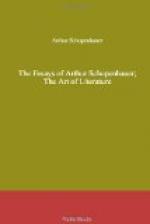A man may have discovered some portion of truth or wisdom, after spending a great deal of time and trouble in thinking it over for himself and adding thought to thought; and it may sometimes happen that he could have found it all ready to hand in a book and spared himself the trouble. But even so, it is a hundred times more valuable if he has acquired it by thinking it out for himself. For it is only when we gain our knowledge in this way that it enters as an integral part, a living member, into the whole system of our thought; that it stands in complete and firm relation with what we know; that it is understood with all that underlies it and follows from it; that it wears the color, the precise shade, the distinguishing mark, of our own way of thinking; that it comes exactly at the right time, just as we felt the necessity for it; that it stands fast and cannot be forgotten. This is the perfect application, nay, the interpretation, of Goethe’s advice to earn our inheritance for ourselves so that we may really possess it:
Was due ererbt von deinen Vaelern hast,
Erwirb es, um es zu besitzen.[1]
[Footnote 1: Faust, I. 329.]
The man who thinks for himself, forms his own opinions and learns the authorities for them only later on, when they serve but to strengthen his belief in them and in himself. But the book-philosopher starts from the authorities. He reads other people’s books, collects their opinions, and so forms a whole for himself, which resembles an automaton made up of anything but flesh and blood. Contrarily, he who thinks for himself creates a work like a living man as made by Nature. For the work comes into being as a man does; the thinking mind is impregnated from without, and it then forms and bears its child.
Truth that has been merely learned is like an artificial limb, a false tooth, a waxen nose; at best, like a nose made out of another’s flesh; it adheres to us only because it is put on. But truth acquired by thinking of our own is like a natural limb; it alone really belongs to us. This is the fundamental difference between the thinker and the mere man of learning. The intellectual attainments of a man who thinks for himself resemble a fine painting, where the light and shade are correct, the tone sustained, the color perfectly harmonized; it is true to life. On the other hand, the intellectual attainments of the mere man of learning are like a large palette, full of all sorts of colors, which at most are systematically arranged, but devoid of harmony, connection and meaning.
Reading is thinking with some one else’s head instead of one’s own. To think with one’s own head is always to aim at developing a coherent whole—a system, even though it be not a strictly complete one; and nothing hinders this so much as too strong a current of others’ thoughts, such as comes of continual reading. These thoughts, springing every one of them from different minds, belonging




